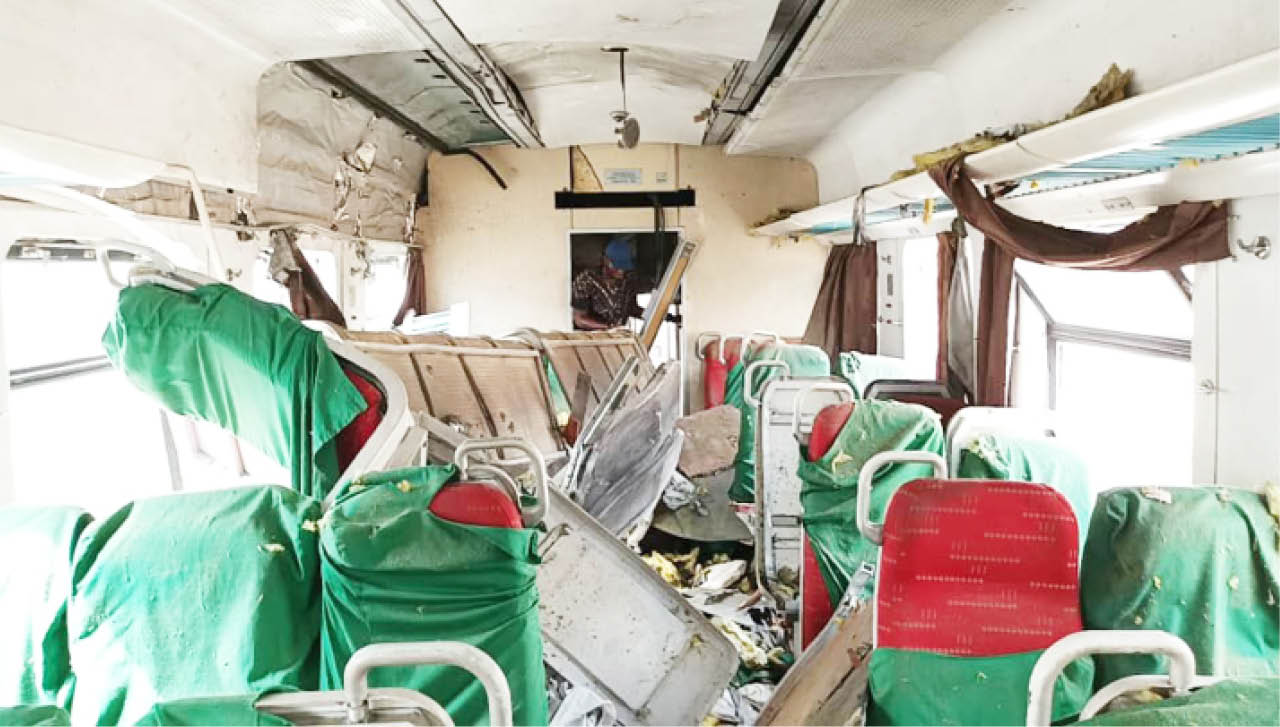Last Friday, the Nigerian Railway Corporation (NRC) announced an indefinite suspension of the resumption of the Abuja-Kaduna train service. It had penultimate Monday, fixed May 23 as the resumption date.
Train operations along the route were stopped following the March 28, 2022, night attack by terrorists on the passenger train heading to Kaduna from Abuja, between Katari and Rijana in Kaduna State, when they detonated explosives on the rail track. They killed about eight persons, left 25 injured and abducted some passengers and crew members.
The attackers later released the Managing Director of Bank of Agriculture, Alwan Hassan, after alleged payment of ransom. They recently also released a pregnant woman on compassionate grounds. To date, the whereabouts of the remaining 61 passengers remain unknown.
The announcement of resumption of the train service was greeted with public outcry, particularly from families of the victims, who termed it a “highly insensitive decision” as their loved ones were still being held hostage.
The spokesman of the relatives, Dr Abdulfatai Jimoh, said since the train abduction, it was “Days of fear, anxiety, tears, agony and trauma and recently, despair. We cannot wait for this to come to an end.”
Last Friday, the spokesman of NRC, Mr Mahmud Yakub, while apologising for the indefinite suspension of services, added that it would resume “soonest.”
The NRC sought the understanding of Nigerians, especially “relatives of those in captivity,” saying its planned resumption should not be misconstrued “as abandonment or nonchalant attitude of the government” towards the plight of the abductees.
“The federal government will never abdicate its responsibility in rescuing these valuable citizens, however, the government assures of its resolve not to succumb to threats by any faceless group,” he added.
But the flip flop on resumption is the usual tardiness with which government officials handle matters of state, with decisions hurriedly taken without first settling fundamental issues. The reactions that made the cancellation necessary ought to have been taken into consideration in the first place.
As a government agency which caters for the interests of Nigerians, the safety of its passengers including those still languishing in captivity due to its inability to rescue them ought to be put into focus before announcing the initial resumption date.
It is the usual attitude of Nigerian public institutions to pretend that all is well without taking cognizance of the implications of their actions on the services they render, and their sustainability.
The cancellation of the resumption of services means that the federal government agencies, especially the NRC and security agencies, can now go beyond the cosmetic “security measures” put in place to beef up security at the train stations and along the tracks, including requiring all passengers to present their “National Identification Numbers (NIN) as part of our internal security checks.”
The requirement that passengers must present a valid Identification Card (ID), reachable telephone number of Next of Kin (NOK) or close relative before boarding a train and that online and offline purchase of tickets must contain the passenger’s individual profile or identification data, ought to have been the standard operating procedure in the first place considering the insecurity in the area. It should be nothing new. But now that it is there, it must be fully implemented.
The right of way along the rail tracks, which outlaws trespassing on both sides, must be enforced by both the officials of the NRC and the police. Also, the villages and settlements along the rail routes should be involved in the new security measures such that they help in providing real-time intelligence.
The typical sloppiness by defence and security operatives, particularly in terms of responding quickly to intelligence or threats, which gave room to the initial attack must stop and all pending security issues must be fully resolved before the resumption.
Also, the NRC should focus more on eradicating the endemic corruption in its operations as they pose major risks to the security of the rail infrastructure and passengers.
These security measures should specifically be strengthened for the early morning and night travels. Banning morning and night travel as the NRC has proposed is not the way to go, as it amounts to the state succumbing to intimidation by criminal elements. The necessary surveillance system must be in place instead of taking decisions out of fear.
Most importantly, the federal government should accelerate the rescue of the abducted victims without further delay. It is painful and callous enough that the relatives of those abducted have been left to their own devices or suffer in silence, in addition to the agony of captivity that the abductees must be going through for nearly two months now.
Any new day they remain in the custody of their abductors is an additional day of vote of no confidence on the security of the train service and the ability of the government to secure the rail tracks and the passengers.
It would be unwise to resume services without full guarantee of the security of the train and hopeful information on the release of the abductees.

 Join Daily Trust WhatsApp Community For Quick Access To News and Happenings Around You.
Join Daily Trust WhatsApp Community For Quick Access To News and Happenings Around You.


